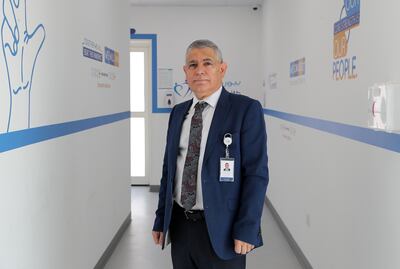Follow the latest updates on the Covid-19 pandemic here
It is one of the world’s busiest airports. Now, Dubai International also has one of the world’s biggest in-house Covid-19 testing laboratories.
A stone's throw from Dubai International’s Terminal 2, the lab reduces waiting times for arriving passengers by making sure their PCR test results are delivered in only four to six hours.
Before the laboratory was launched in June, the passengers’ samples used to be collected from the airport every 12 hours and sent to various labs in the city. Now samples are collected every 30 minutes and taken to the in-house centre operated by Pure Health.
The laboratory is open round the clock and has the capacity to process 100,000 samples a day.
“I think one of the keys is regular delivery," said Carlo Kaabar, medical director of the Ministry of Health and Prevention laboratories, as he gave The National a tour of the 1,860-square-metre facility.
"We don’t wait a few hours to receive a big batch at once, we're doing it regularly.
"We receive manageable batches and we keep delivering the results. That's a simple formula that has worked very well for us.”
More than 330 healthcare staff at the airport collect PCR samples from passengers, and about 100 people work behind the scenes in the lab to process them.
“The fact that it's in the vicinity of the airport, that's obviously a big plus. We didn't want the transport to be a bottleneck,” said Mr Kaabar.
After a batch of samples is received, the staff check them and verify the passengers’ details using barcodes.
The team then conduct the polymerase chain reaction (PCR) test to detect genetic material from the virus using the latest World Health Organisation-standard equipment.
The results are delivered to the passenger by a text message and also made available on the Al Hosn mobile application.
Passengers are required to remain in their hotel or residence until they receive the result. If they test positive, they need to go into isolation and follow the Dubai Health Authority guidelines.
The laboratory is also linked to government reporting platforms to share information between health authorities and airlines, said Essa Al Shamsi, vice president of terminal operations at Dubai Airports.
“So far, we have tested more than five million passengers at Dubai International Airport since the pandemic started. More than 110 airport staff have been vaccinated at an in-house vaccination centre as well,” he said.
Dubai's airport operator expects an influx of travellers as Covid-19 restrictions ease and the emirate hosts global events.
Passenger traffic at Dubai International is anticipated to reach at least 56 million in 2022, its chief executive Paul Griffiths said in August.
“The laboratory is prepared to handle surges in passenger traffic, especially with major events such as Expo 2020,” he said.
“The laboratory also has potential to increase its capacity in future, if needed, because of the way it’s built. It just gives passengers that extra confidence when they come to this country.”














